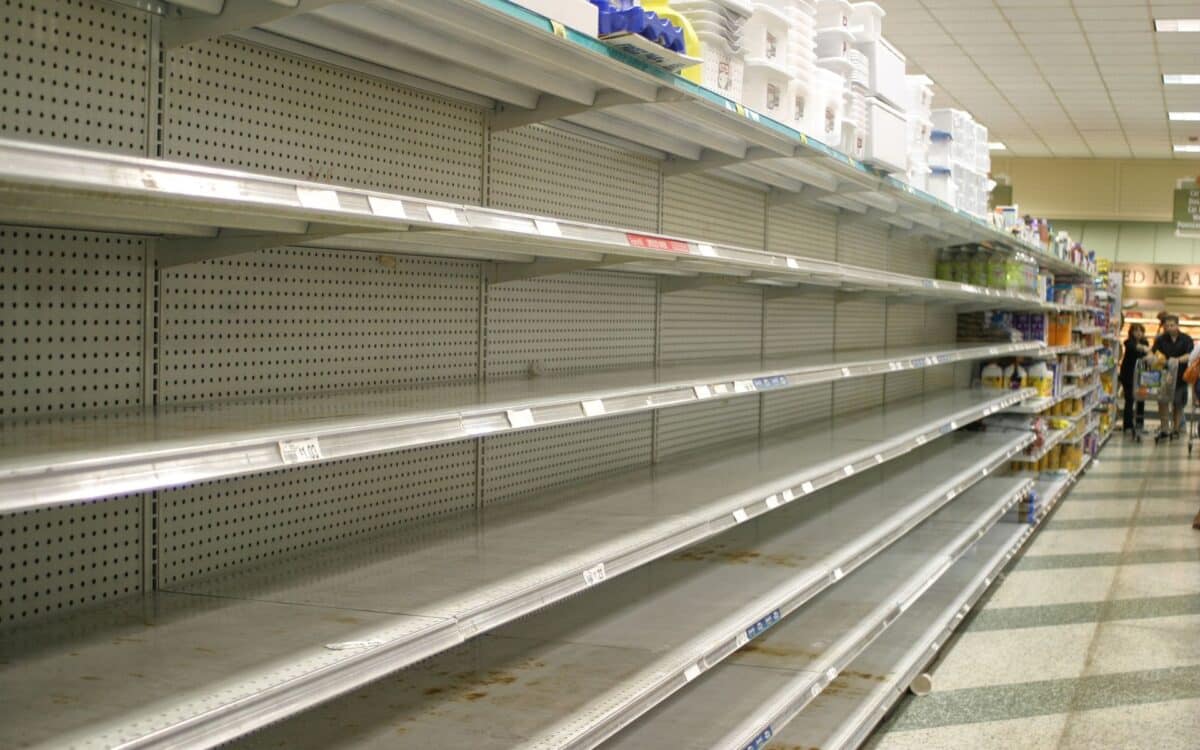A growing number of common household items are becoming scarce across the United States in 2025. Retailers and analysts point to a convergence of climate disruption, labor instability, and an intensifying global trade conflict.
From cleaning products to packaged foods, the effects are gradually reshaping consumer access and spending habits in subtle but persistent ways. According to a recent overview by MSN, shortages are extending into categories previously seen as stable, raising concerns about long-term availability.
The impact is increasingly visible across sectors, as products vanish from shelves without clear timelines for restocking, leaving many households adjusting to unpredictable inventory patterns.
Climate Stress Hits Global Agriculture and Food Imports
Several agricultural staples are directly affected by climate change. In Southern Europe, persistent drought has decimated olive harvests in Spain and Italy, cutting production by up to 60%. With the United States producing only 5% of the olive oil it consumes domestically, this shortfall is significantly reducing availability and driving up prices in U.S. markets.
In the case of coffee, over 99% of what Americans drink is imported. Severe drought and extreme heat in Brazil—the world’s top producer—have reduced the 2024 harvest by 10–15% compared to peak years. Experts anticipate further drops for the 2025 cycle, putting additional pressure on both availability and pricing.
Chocolate supply chains are also strained. West African cocoa crops have been heavily affected by plant diseases and climatic stress, leading to reduced yields. Consumers will likely see higher retail prices, fewer promotions, and discontinuation of certain product lines.
Household Goods Disrupted by Tariffs and Raw Material Shortages
The trade environment has grown increasingly hostile, particularly between the U.S. and China. Plastic household products—such as storage bins, food containers, and drawer organizers—are becoming less available. These products depend on low-cost petroleum-based materials and Chinese manufacturing, both of which are now subject to elevated tariffs and shipping delays.
Cleaning products face similar disruptions. Many spray nozzles and bottles are produced in China and are no longer arriving in expected volumes. Additionally, key active cleaning chemicals are harder to source due to global supply chain fragmentation.
Pet supplies, including toys, grooming tools, collars, and feeding bowls, are understocked due to high shipping costs, tariff hikes, and factory slowdowns in China and Southeast Asia. Home goods, including furniture and home decor, are impacted by the same factors. As costs rise, retailers are passing on price increases to consumers while simultaneously reducing inventory levels.
Packaging and Raw Materials Under Strain
Cardboard and packaging materials—including boxes, mailers, tape, and bubble wrap—are in limited supply. The packaging industry is grappling with a shortage of pulp, reduced recycling activity, and rising e-commerce shipping volumes.
Paper products such as toilet paper and paper towels are increasingly expensive due to constraints on wood pulp imports from Canada and South America. These challenges are compounded by international shipping bottlenecks and elevated tariff barriers.
Electronics, Medical Items and Batteries Remain Difficult to Source
Electronics continue to face limited availability. Devices like laptops, tablets, gaming consoles, and smart home appliances remain in short supply due to a persistent semiconductor shortage. While consumer demand has normalized since the pandemic, production remains constrained.
Personal care products, including toothpaste, shampoo, and soap, are affected by a 145% tariff on certain imports from China, resulting in a market withdrawal by several brands. In the health sector, over-the-counter medications such as ibuprofen and allergy treatments are harder to find.
These shortages stem from disruptions in pharmaceutical ingredient production in India and China. Medical equipment such as masks, gloves, and thermometers is also in short supply due to international production constraints.
Battery shortages are another emerging trend. Products affected include AA, AAA, and lithium coin cell batteries, widely used in toys and household electronics. This is linked to rising global demand for lithium and cobalt, materials now prioritized for electric vehicles and renewable energy systems.
Fresh Produce and Fashion See Delays and Pricing Shocks
Imported fresh fruits such as avocados, bananas, and berries are less available due to droughts in Latin America and higher freight costs from South American exporters. U.S. growers face their own hurdles: increasing water costs, migrant labor shortages, and logistical delays.
In the apparel industry, clothing and footwear shipments have slowed. Overseas textile production has been delayed, and U.S. retailers are anticipating lean inventories for the back-to-school and holiday seasons.
Seasonal Goods Face Customs Delays and Order Cuts
Seasonal items such as fireworks, Halloween decorations, and Christmas lights are experiencing shipment delays due to congestion at overseas ports and tightened customs inspections.
Most of these products are manufactured in China, and importers have begun cutting orders or switching to smaller, more expensive batches.
Baby Diapers Impacted by Material and Packaging Bottlenecks
Baby diapers are another affected category. The superabsorbent polymers and plastic materials used in diaper production are derived from volatile petroleum markets. At the same time, the availability of packaging materials has declined, further disrupting distribution.









